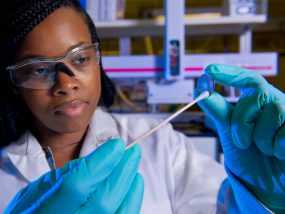Cardiovascular Disease Biomarker Standardization Programs
Cardiovascular (or heart) disease is the leading killer of Americans, accounting for approximately 960,000 deaths each year. People with high cholesterol have about twice the risk of heart disease than people with lower levels. At least 50 million U.S. adults have levels of cholesterol in their blood that require medical advice and treatment. A vital step in reducing the number of heart disease-related deaths in the United States is to identify those at risk, based on high blood cholesterol.
The Centers for Disease Control and Prevention (CDC) maintains programs to improve the detection and diagnosis of cardiovascular diseases by ensuring laboratory measurements that test patients’ blood for cholesterol levels are accurate and reliable. This is done through CDC’s Reference Laboratory and Clinical Standardization Programs. Standardization is an activity in which the accuracy, precision, and other analytical performance parameters of a laboratory test are assessed against analytical performance goals. This assessment is done by an independent, impartial, and competent organization. Thus, a standardized laboratory test is a test that has demonstrated (through an independent and impartial assessment) an analytical performance (such as accuracy and precision testing) that meets specific analytical performance goals.
CDC’s Reference Laboratory and Clinical Standardization Programs work to:
- Provide reference measurements for total cholesterol (TC), high-density lipoprotein (HDL)-cholesterol, low-density lipoprotein (LDL)-cholesterol, and total glycerides (TG) (CDC Reference Laboratory)
- Assess the accuracy of TC, TG, LDL-C and HDL-C tests used in patient care and public health (Cholesterol Reference Method Laboratory Network [CRMLN])
- Monitor the accuracy of laboratories performing these tests over time (Lipids Standardization Program [LSP])
Approximately 71 million American adults have high low-density lipoprotein (LDL), or “bad,” cholesterol. CDC’s Cardiovascular Disease Biomarker Standardization programs help ensure tests used to identify these people are accurate and reliable. Once identified they can be treated to reduce their risk of death from heart disease.
- Page last reviewed: July 6, 2017
- Page last updated: July 6, 2017
- Content source:


 ShareCompartir
ShareCompartir



